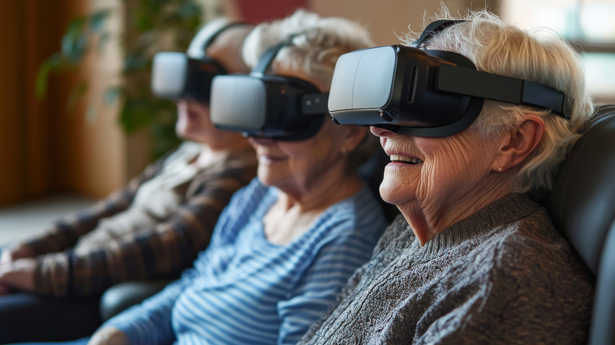
In April, Amica The Glebe in Ottawa hosted an enchanting Italy-themed event, "Sip and Savour," providing residents with an engaging, immersive experience. Guests indulged in the flavours and aromas of Italy, including antipasto, ragout of short rib, fine wines, and pistachio crema for dessert. A highlight of the event was a virtual reality (VR) experience that transported residents and guests to the cobblestone streets of Italy. Participants fully immersed themselves in the Italian experience - , all from the comfort of their residence.
Alongside pasta-making classes, wine tastings, and Italian language lessons, residents were equipped with Meta Quest VR headsets preloaded with picturesque scenes from Tuscany, Florence and Rome. Through the headsets, Amica seniors were whisked away to an indoor Italian café where they could sit at a bistro table, sip fresh espresso, and receive a treat while listening to live Italian music.
The event, also held at Amica Pickering, was part of a pilot project to incorporate virtual reality into Amica’s life enrichment events, and needless to say, it was a hit with residents and guests alike. Dominic, a resident at Amica Pickering, said, “I feel like I’m home again.”
Forward-thinking senior living residences like Amica have been adopting VR technology in their programming, and some studies show it can help boost mood, aid with memory loss, and even combat loneliness. For Amica residents, it’s also a way to experience travel again—something they used to enjoy but may no longer have access to in their later years. Louise, a resident at Amica The Glebe, said, “This is fabulous because it takes you back. I was a lot younger then, and I can relive it all!"
Melanie Wells, Vice President of Marketing & Communications at Amica Senior Lifestyles, proposed using virtual reality for life enrichment at the company. After experiencing the power of VR firsthand in a previous role, where she used the technology to transport event attendees to a tropical paradise in the Caribbean, she was inspired to introduce VR to Amica’s community. "Many of our residents have traveled the world,” says Wells. “[And] if you loved traveling before, you probably still love it now - you may not have the ability, but you still have the desire."
It’s all part of what Wells calls “making worlds bigger” for seniors, who may have mobility or health issues, and often have to downsize their physical spaces when transitioning to senior living. “The perception is that when you retire or move into either senior living or a care facility, it's kind of ‘the beginning of the end,’” says Wells. However, research has shown that “people want their worlds to stay big or become bigger versus smaller. And so this VR opportunity is helping keep worlds bigger.”
Bringing faraway lands to seniors through VR is also a way to combat the sense that “every day is the same” that can happen in this phase of life. To that end, Wells wanted to tap into anticipation and novelty - the idea that thinking about something positive happening in the future can boost positive feelings. “We know that anticipation releases dopamine, or positive hormones,” says Wells. “Sometimes, the anticipation is even more pleasurable than the event itself.”
Lillian Hung, associate professor in the School of Nursing at UBC, started incorporating virtual reality in her work with seniors in long-term care as a way to spark joy and alleviate loneliness during the pandemic. Hung, who holds a Canada research chair in senior care, works with a team of students in Vancouver to bring virtual experiences to seniors, such as fireworks displays, visits to the beach, or even trips to their hometowns. “It's an immersive feeling because you’re in the real world, and then you put the headset on, and you're transported to somewhere completely different,” says Hung.
But virtual reality extends beyond simply seeing and feeling new experiences; the technology enables individuals to communicate, laugh, and form connections through those shared experiences. “The research that we do challenges the assumption that seniors cannot benefit from technology. And in fact, they not only benefit from it - they get a lot of joy from it,” says Hung. “After a VR session, they talk about the experience and themselves. So that's the social connection piece - to be able to share joy and also get to know each other.”
Hung believes that VR technology has the potential to provide even more enhanced experiences in the future by integrating artificial intelligence (AI). She says the next phase may involve the ability to create hyper-personalized content by restoring old family photos or videos that were thought to be beyond repair. “There's a lot of exciting opportunity ahead of us,” she says.
Amica is planning more VR-enhanced experiences, such as upcoming holiday and Canadian-travel-themed “Sip and Savour” events. Wells says the team is continuously looking for more ways to incorporate the technology into its programming and is acquiring Meta VR headsets for each region of its residences in Ontario and BC.
“We learned that the more we can show [residents] the outdoors and [other adventures], the more we can help [seniors] feel that they're living equally, if not better, than they were before they moved in,” says Wells.
